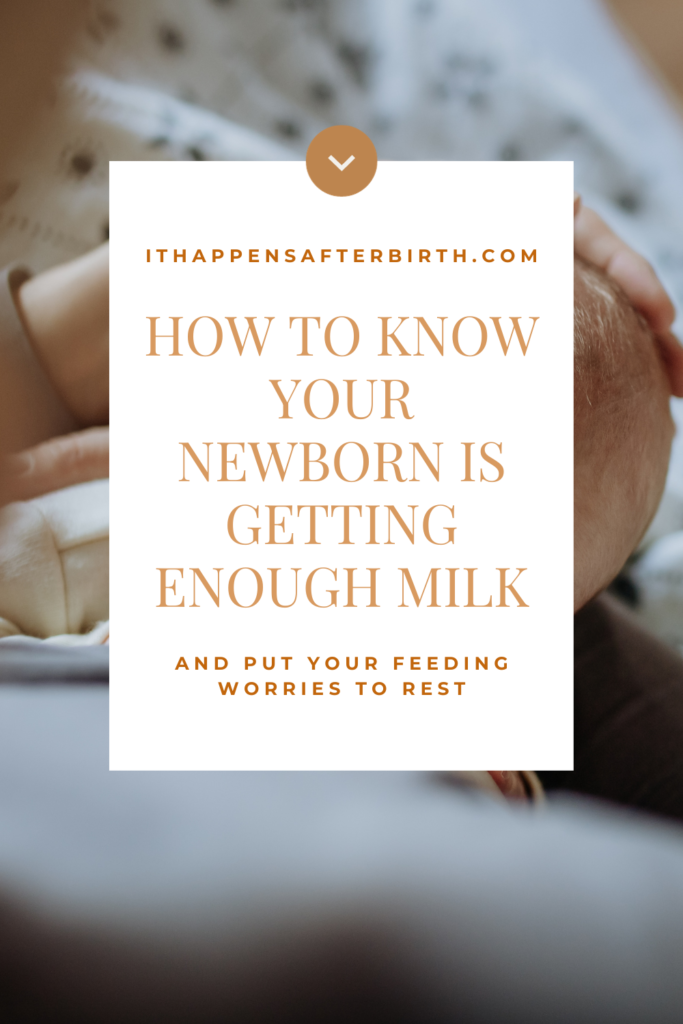Worried about feeding your newborn? Here’s how to know if they’re getting enough milk.

Apart from the decision of how we will feed our newborn, one of the most consistent worries as new parents is whether our baby is getting enough to eat. Are they thriving? Are they eating well? Eating enough, or eating too much?
We turn to the internet for answers, but sometimes (most times) we end up even more discouraged, confused, and anxious.
One source says this, another that. Even if our care provider isn’t concerned, should we be? And now that we’re getting all of this information about feeding, DID we make the right choice for our baby after all?
If you got as stressed reading that as I did typing it, you are far from alone. It’s actually a good thing that you’re concerned about your baby’s eating- it shows how much you want to care for your newborn in the right way. What is NOT good is getting lost in a sea of information and worry trying to figure out if you are.
So, in the interest of your mental sanity, here it is- a straightforward and easy-to-read post about feeding your newborn.
How often do babies need to eat a day?
One thing you will want to keep in mind is that the eating needs and habits of breastfed and formula-fed babies differ. Some key differences is that babies who are fed formula often drink more milk in one sitting, with more time in between feedings. They also tend to sleep in longer stretches through the night at an earlier age than their breastfed counterparts. (This is because formula is not digested by the body as quickly and easily as breastmilk is, leaving them feeling fuller for longer.) Breastfed babies may not drink as much in one sitting and can eat more often, usually just taking as much milk as they need at that specific time. And as I just noted, their bodies digest breastmilk more quickly and completely, causing them to need to eat sooner than their formula-fed counterparts.
In the first 2-3 months, babies will need to eat often. (Again, formula-fed babies will eat less often than breastfed babies.)
For breastfed babies:
They will need to eat 8-12 times per day, or about every 2-3 hours. This includes overnight. Breastfed babies may not follow a predictable routine for feeding, however. They may eat every 2-3 hours during the day, and then begin cluster feeding in the evening. Cluster feeding is when your newborn eats every 30-60 minutes, or almost continuously. Or they may cluster feed during the day!
Formula-fed babies:
In the first month, babies on formula will eat about 6-8 times per 24 hours. This also includes overnights, but with more hours in between feedings. In the second month, the number of feedings may drop to between 5-6 for every 24 hours.
The best rule to follow is simply to feed your baby when they are acting hungry!
How much milk does my newborn need at each feeding?
Formula was once considered a standard for feeding newborns, so a lot of our sense of “normal” baby feeding is based off of formula-fed babies. Breastfed babies don’t follow a rigid schedule when it comes to how often they eat, or how much.
On average, a baby drinking formula will take about 2-4oz per bottle in the first month. Over the next couple months, they could start drinking 5-7oz per bottle.
A breastfed baby, on average, will consume about 1 1/2-4oz of milk per feeding in the first month.
How do I know when my baby is hungry?
Newborns have a few easy-to-recognize signals for when they’re starting to get hungry. The easiest signal to spot is rooting! Rooting is when they open and close their mouths and turn their heads to search for something to suck on. If you see your newborn doing that, they’re likely getting hungry and want to eat. Other signals include:
- wriggling around or restlessness
- sucking on something in close proximity- this could be the hem of your shirt, their fingers, or their fist
- Fussing and brief crying, squeaking noises
Crying is a late sign of hunger. If you catch your newborn’s hunger cues before they cry, it makes it easier to get a good latch.
How do I know my baby is getting enough to eat?
When feeding your newborn with a bottle (whether via formula or pumping), it’s easy to make sure that they’re getting a healthy amount of milk.
When you’re feeding them solely from the breast, you can’t see how much milk they’re getting. And if they’re fussy or nursing more often, you might get concerned about whether you’re providing them with enough milk.
Remember, newborns’ stomachs are very small! The stomach capacity of a newborn is only about the size of a walnut.
There’s a very easy way to ensure that your newborn is, in fact, getting enough to eat.
Check their diaper output!
A newborn getting a healthy and adequate amount of milk should have 5-6 wet diapers per day. (Starting at 3 days postpartum.) They should also be having 3-4 bowel movements per day starting after 3 days postpartum.
(Breastfed babies older than 6 weeks can go up to 10 days without a bowel movement, and this is okay. It’s due to how well their bodies digest breastmilk!)
A “normal” bowel movement is considered to be anything the size of a quarter or more.
Also, check the color of the bowel movement! It should be mustard-colored (peanut-butter colored for formula-fed babies) by day 3 postpartum. If it’s still a black to green color, let your care provider know.
Now that we’ve covered the easiest way to tell your newborn is getting enough milk, here are a few other ways you can tell that you are getting enough milk to your baby.
- In the first few weeks, baby will fall asleep and slip off of the breast when full of milk.
- Baby moves to comfort nursing instead of nursing to satisfy hunger. The best way to tell if your baby is nursing for comfort vs nursing because they’re hungry is to count how many “sucks” they do before swallowing. If they only suck one or two times before swallowing, that’s a sign that milk is being transferred from the breast and they’re actively drinking it. If it’s around 4-5 sucks per swallowing, that’s a sign that milk is not actively being transferred and baby is nursing for comfort.
- You feel sensations of a let-down during feeding, and can hear sounds of swallowing
- Your baby is alert when awake, not acting sleepy all the time
Weight loss in babies
Some parents who breastfeed may measure milk intake by how much weight their baby is gaining. Remember, it is normal for babies to lose 5-7% of their birth weight in the first week of life.
If your baby has lost more than 7%, or is struggling to gain weight back(babies should be back to birth weight by day 10 postpartum), talk to your care provider about what steps you can take to help your baby get back on a healthier path.
What it looks like if your baby is not getting enough milk
If you are worried that your baby isn’t getting enough to eat, but you’re not sure, here are the signs to look for.
- Too much weight loss
- Lack of wet diapers during the day
- Lack of bowel movements
- Signs of dehydration (soft spot sunken in, sleeping an unusual length of time for a newborn, wrinkly skin, eyes sunken in, or discolored hands/feet)
If you notice any or all of these symptoms from your newborn, contact your care provider or pediatrician right away.
What should I do if I’m concerned about my newborn’s milk intake?
If you’re ever concerned, or have reason to think that your baby is not getting enough milk, call your care provider or your baby’s pediatrician.
Don’t discount any intuition- you know your baby best, and it’s always better to double check and be safe rather than sorry.
If you’re concerned about how breastfeeding is going, reach out to a lactation consultant, IBCLC, or La Leche League Leader in your area.

